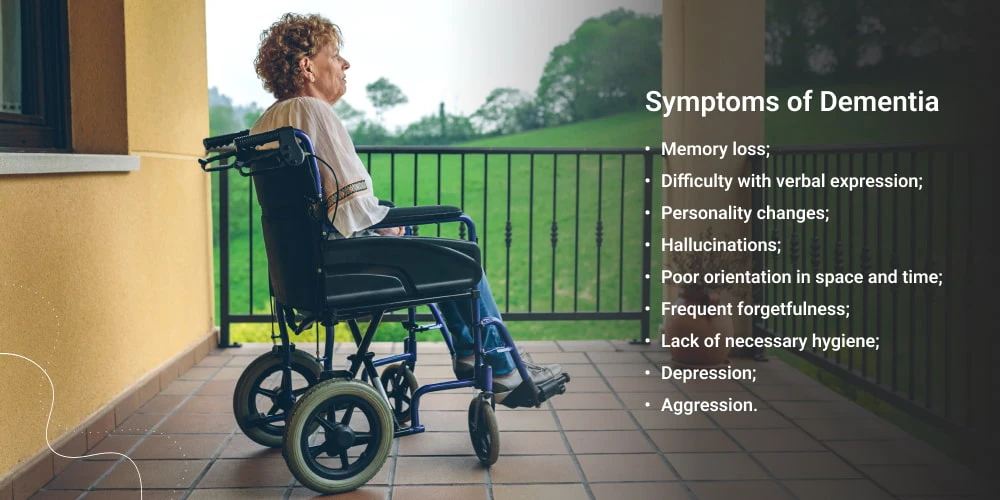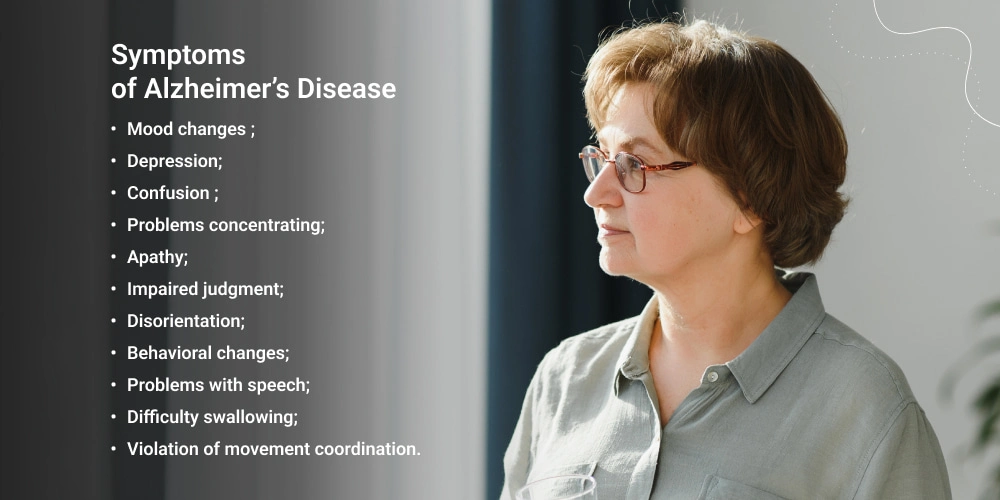Many people mistakenly confuse dementia and Alzheimer’s, thinking they are the same thing but are not. Among the main differences between these conditions, experts note that, unlike dementia, in Alzheimer’s disease, symptoms begin slowly and develop gradually, memory loss is the main consequence of this disease, and the life expectancy of a patient with this disease is higher. The word “dementia” is used to describe a group of symptoms that can have many causes. The symptoms of dementia are mainly memory loss and problems with routine activities and communication with others.
Both of these problems most often occur in patients over 65, but they can occur at any age. Although the symptoms of these conditions can coincide, it is necessary to be able to distinguish between these conditions.
In this article, we will look at the description of these two problems, consider their causes and symptoms, and also find out if there is a difference between dementia and Alzheimer’s disease.
What is Dementia?
Dementia is not a disease. This is one of the reasons why Alzheimer’s disease and dementia are not the same. Dementia is a syndrome, a set of symptoms with no specific diagnosis. Dementia most often occurs in people with Alzheimer’s disease. Dementia harms many cognitive functions such as memory and thinking.
Dementia comes in many types; some patients may have more than one type of dementia. Unfortunately, dementia has the property of progression; if this occurs, the patient’s condition may worsen and lead to disability. In addition, according to statistics, dementia ranks fifth on the list of diseases that cause death in humans.
What are the Types of Dementia?
One of the reasons why Alzheimer’s disease and dementia are not the same conditions is the existence of different types of them.
As we have said, there are different types of dementia. Let’s look at the types of this syndrome in more detail.
- Vascular Dementia
This type of dementia usually occurs due to blockage of blood flow to a person’s brain and may be associated with strokes or plaque in the arteries. Symptoms of the disease can begin slowly and quite suddenly.
- Dementia with Lewy Bodies
This dementia is a progressive disease. It can be caused by protein deposition in the nerves, disrupting electrical signals. Symptoms of this type of dementia include changes in thinking, confusion, and movement disorders.
- Dementia Associated with Parkinson’s Disease
This dementia causes deterioration in cognitive abilities and we have to say that Alzheimer’s disease also has this problem, so it can be the same thing between them. This syndrome often occurs in people with Parkinson’s disease about a year or more after being diagnosed. Analyzing statistics, 50-80% of people with Parkinson’s disease suffer from dementia ten years after diagnosis.
- Frontotemporal Dementia
This syndrome is characterized by brain dysfunction in the area of the brain near the forehead or behind the ears. The Alzheimer’s Association suggests that behavioral changes are often among the first symptoms of frontotemporal dementia.
- Posterior Cortical Atrophy
It is the deterioration of the outer layer of the patient’s brain, which is called the cortex and is located at the back of the brain. Symptoms of this type of dementia can vary but usually involve difficulty with visual tasks such as reading or seeing moving objects.
- Creutzfeldt-Jakob Disease
It is a relatively rare infectious disease. This disease causes a rapidly progressive dementia that begins with symptoms such as problems with muscle coordination, personality changes, and visual disturbances.
- Wernicke-Korsakoff Syndrome
This syndrome occurs against the background of a lack of vitamin B1 in the body. One of the most common causes of this syndrome is alcoholism. Among the symptoms of this syndrome, experts note double vision, confusion, drooping of the upper eyelids, and loss of muscle coordination. The presence of such symptoms once again confirms that Alzheimer’s disease and dementia are not the same conditions.
- Mixed Dementia
This type of dementia means that the patient has several types of dementia.
- Normal-pressure Hydrocephalus
This syndrome occurs due to the accumulation of fluid in the ventricles of the patient’s brain. Among the consequences of the appearance of this syndrome, one can note an impairment of consciousness and difficulties associated with the movement and control of the bladder. The exact cause of this condition is not known, but suspected causes include head injuries, infections, cerebral hemorrhages, and previous surgeries.
Symptoms of Dementia
When we talk about what the difference between dementia and Alzheimer’s disease is, we should say that these conditions have different symptoms. For example, dementia can be accompanied by the following symptoms:
- Memory loss;
- Difficulty with verbal expression;
- Personality changes;
- Hallucinations;
- Poor orientation in space and time;
- Frequent forgetfulness;
- Lack of necessary hygiene;
- Depression;
- Aggression.
Causes of Dementia
Experts note the following reasons why dementia can occur:
- Chronic drug use;
- Stroke;
- Vascular disease;
- Infections such as HIV;
- Vascular diseases;
- Head trauma;
- Depression.
How to prevent or slow down Dementia with diet and brain foods find out from our article.
What is Alzheimer’s Disease?
We have told you there is a difference between dementia and Alzheimer’s disease and that these conditions are not the same. But to finally show you the difference between them, we should consider Alzheimer’s disease in more detail.
Alzheimer’s is a brain disease that tends to progress and progressively impair memory and cognitive function. The specific cause of the disease is still unknown, and there is no cure for this disease. Alzheimer’s disease usually affects people over 65, but sometimes younger people get the disease.
How Alzheimer’s Disease Affects the Brain
Another factor that confirms that dementia and Alzheimer’s disease are not the same thing is the effect of the condition on the brain. Let’s consider how Alzheimer’s disease affects the brain.
In people who have Alzheimer’s disease, brain cells gradually die off, and the connections between the remaining cells are significantly destroyed.
- One of the main symptoms is the accumulation of plaques – abnormal protein deposits that appear in the brain. These protein deposits look like dense protein clusters. They can block communication between neurons. Proteins twisting together are called tangles and cause healthy brain cells to begin to die.
- The brain begins to contract strongly in a person with Alzheimer’s. The development of the disorder in the brain can occur over decades.
- The only way to confirm the presence of the disease is to examine the patient’s brain under a microscope. However, doctors have learned to correctly diagnose this in 90% of cases with regards to this disease.
Symptoms of Alzheimer’s Disease
Actually, symptoms of Alzheimer‘s disease and dementia are also not the same.
Alzheimer’s may include symptoms such as:
- Mood changes;
- Depression;
- Confusion;
- Concentrating difficulty;
- Apathy;
- Impaired judgment;
- Disorientation;
- Behavioral changes;
- Problems with speech;
- Difficulty swallowing;
- Violation of movement coordination.
Causes of Alzheimer’s
- Genetic predisposition;
- Diabetes;
- Chronic hypertension;
- High cholesterol;
- Traumatic brain injury.
Alzheimer’s vs. Dementia: Comparison Table
We have prepared a comparative table in which we have seen what the difference between dementia and Alzheimer’s disease is so that our readers can better understand the main differences between these conditions.
| Alzheimer’s | Dementia |
| It is a disease | It is a syndrome (complex of symptoms) |
| Has no official causes | Has specific causes |
| The absence of symptoms that include an increase in muscle tone and sleep disturbance, at least at an early stage of this disease | Symptoms of this syndrome include an increase in muscle tone and insomnia |
| This disease primarily affects short-term memory | This syndrome has speech disorders, emotional disorders, and difficulties in planning and solving problems |
| It develops rather slowly – the process of disease development can take several years | The deterioration comes suddenly and more abruptly |
| Probable causes can be connected with a hereditary predisposition and neurological diseases | The causes of the appearance are vascular pathologies |
| Memory loss is gradual | Memory loss occurs suddenly and can rapidly develop quite quickly and jerkily (it’s one of the main reason why Alzheimer’s disease and dementia are not the same things) |
| Life expectancy is longer | The life expectancy of a patient with this syndrome may be lower |
| Women are more likely to suffer from this disease | Men are more likely to suffer from dementia |
So, you can see what the main differences between dementia and Alzheimer’s disease are. Doctors say that not every dementia is associated with Alzheimer’s disease, but every Alzheimer’s disease ends in dementia.
Regarding such a question as “Which is worse, dementia or Alzheimer’s disease?”, we should say that these two conditions are hazardous for the patient. But as a rule, dementia is a more complex problem because it can happen unexpectedly out of the blue. The patient’s condition can be severe immediately, and the syndrome’s symptoms can worsen quickly. Also, as you can see from the table, dementia patients live much shorter lives.
Book a Consultation at Lone Star Neurology
We have explained to you why dementia and Alzheimer’s disease are not the same things. These conditions can have different causes, symptoms, and effects. Both conditions are life-threatening for the patient and require immediate medical attention. If your loved one has Alzheimer’s, you should take them to the doctor.
Our experienced and highly qualified specialists help diagnose and treat many neurological diseases using modern equipment. To make an appointment with our specialists, call us at (214) 619-1910.
We treat various neurological disorders such as:
- Concussion;
- Dementia;
- Stroke;
- Diabetic neuropathy;
- Dystonias;
- Peripheral neuropathy;
- Epilepsy;
- Alzheimer’s disease;
- Headaches and migraines;
- Parkinson’s disease;
- Multiple sclerosis.
This is not a complete list of the disorders we can help with; our specialists deal with many diseases. Go to our website to read more about our clinic. Check out our blog with many helpful articles about different diseases, their diagnosis, and treatment.
FAQs
- Can Alzheimer’s disease be cured?
Unfortunately, there is currently no cure for Alzheimer’s disease. But there are medicines with which you can improve the patient’s condition. Timely consultation with a specialist and the use of prescribed drugs can make life easier for the patient and slow down the course of the disease.
- What does Alzheimer’s do to a person?
As Alzheimer’s disease progresses, patients begin experiencing significant memory loss and other cognitive difficulties. Problems may also include the patient getting lost on the street, becoming incapable of coping with household chores, becoming distracted, repeating the same information constantly, and having personality and behavioral changes.
- How can dementia be prevented?
Currently, science has not found a way to prevent the onset of dementia, as the exact cause of its occurrence is unknown. However, there is evidence that a healthy lifestyle can help reduce the risk of dementia later in life.
- How does a person get dementia?
Dementia happens to a patient due to damage or loss of nerve cells and their connections in the brain. Depending on the damaged area of the brain, dementia affects people differently and may include different symptoms.














Please, leave your review
Write a comment: